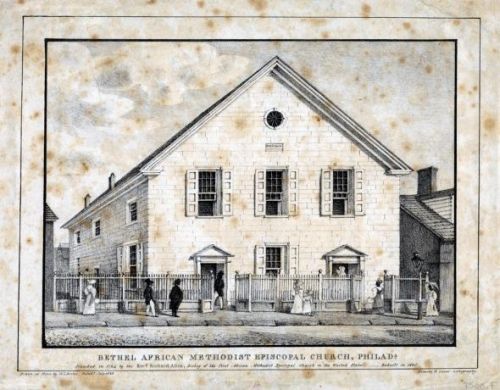
The Mother Bethel African Methodist Episcopal Church is a historic church and congregation at 419 South 6th Street in Center City Philadelphia, Pennsylvania, USA. The congregation, founded in 1794, is the oldest African Methodist Episcopal congregation in the nation. Its present church, completed in 1890, is the oldest church property in the United States to be continuously owned by African Americans. It was designated a National Historic Landmark in 1972.
The church was organized by African-American members of St. George’s Methodist Church who walked out due to racial segregation in the worship services. Mother Bethel was one of the first African-American churches in the United States, dedicated July 29, 1794, by Bishop Francis Asbury. On October 12, 1794, Reverend Robert Blackwell announced that the congregation was received into full fellowship in the Methodist Episcopal Church. In 1816 Rev Richard Allen brought together other black Methodist congregations from the region to organize the new African Methodist Episcopal Church denomination. He was elected bishop of this denomination. After the American Civil War, its missionaries went to the South to help freedmen and planted many new churches in the region.
Allen and his wife, Sarah Allen are both buried in the present church’s crypt. The current church building was constructed in 1888-1890, and it has been designated a National Historic Landmark.
With financial assistance from individuals such as Dr. Benjamin Rush and President George Washington, Allen purchased a piece of land at 6th and Lombard streets in Philadelphia. He also bought an old blacksmith shop and moved it to the 6th and Lombard location. The Blacksmith Shop Meeting House, as the structure came to be called, was remodeled into a house of worship and dedicated on July 29, 1794. The pastor of St. George, the Reverend John Dickins, suggested that the new church should be called “Bethel” for the gathering of thousands of souls. The church still carries this name today. Just one year after its founding, Bethel’s congregation numbered 121. Ten years later, in 1805, the congregation had grown to 457, and the church decided to expand.
Two lots adjoining the original 6th and Lombard site were purchased and a new building was constructed to replace the original Blacksmith Shop Meeting House. Although technically still part of the predominantly white Methodist Episcopal Church, the Bethel congregation limited membership to “descendants of the African race” in an attempt to retain a degree of autonomy. Limiting membership to African Americans, however, did not quell disagreements between Bethel and the Methodist Episcopal Church over issues such as the choice of pastors and property ownership.
The courts ultimately decided in favor of independence for Bethel, and in 1816, the 1,300 member congregation joined with black congregations from Baltimore, Maryland, Salem, New Jersey, and Attleborough, Pennsylvania to form the African Methodist Episcopal (AME) Church. Allen served as the first bishop for the African Methodist Episcopal Church. Bethel AME Church has a long history of engagement with civil rights issues.
In 1795 the church provided refuge to thirty runaway Jamaican slaves. In 1817 Bethel hosted a meeting where approximately 3,000 people of African descent protested the formation of the American Colonization Society (ACS), which sought to resettle free blacks from the United States to Sierra Leone. The church provided financial support to the Underground Railroad, and following the Emancipation Proclamation of 1863, it helped ex-slaves who began migrating to Philadelphia. Lucretia Mott, Frederick Douglass, and Martin Luther King have been among the many distinguished leaders who have spoken at Bethel AME.
In 1953 the word “Mother” was added to the church’s name and women were permitted to participate in the business of the church corporation for the first time. The church has been remodeled twice since 1805, the last time in 1889 when it moved to its current location on the Southeast corner of Sixth and Alfred (now Addison) Streets. Mother Bethel still has a vibrant congregation today. – See more
Information courtesy of: http://www.blackpast.org/aah/mother-bethel-african-methodist-episcopal-ame-church-1794#sthash.F7pwHPQ0.dpuf
